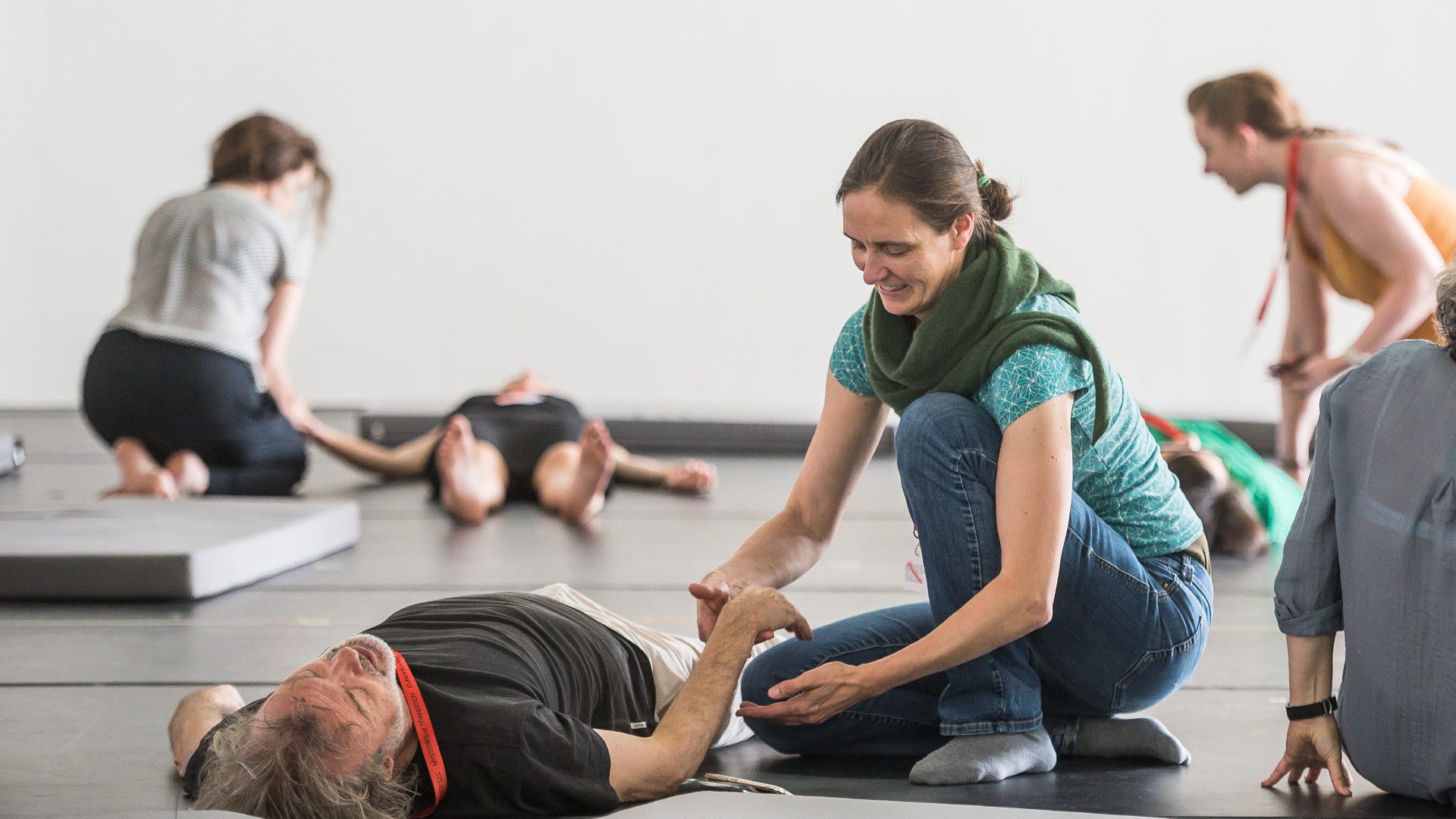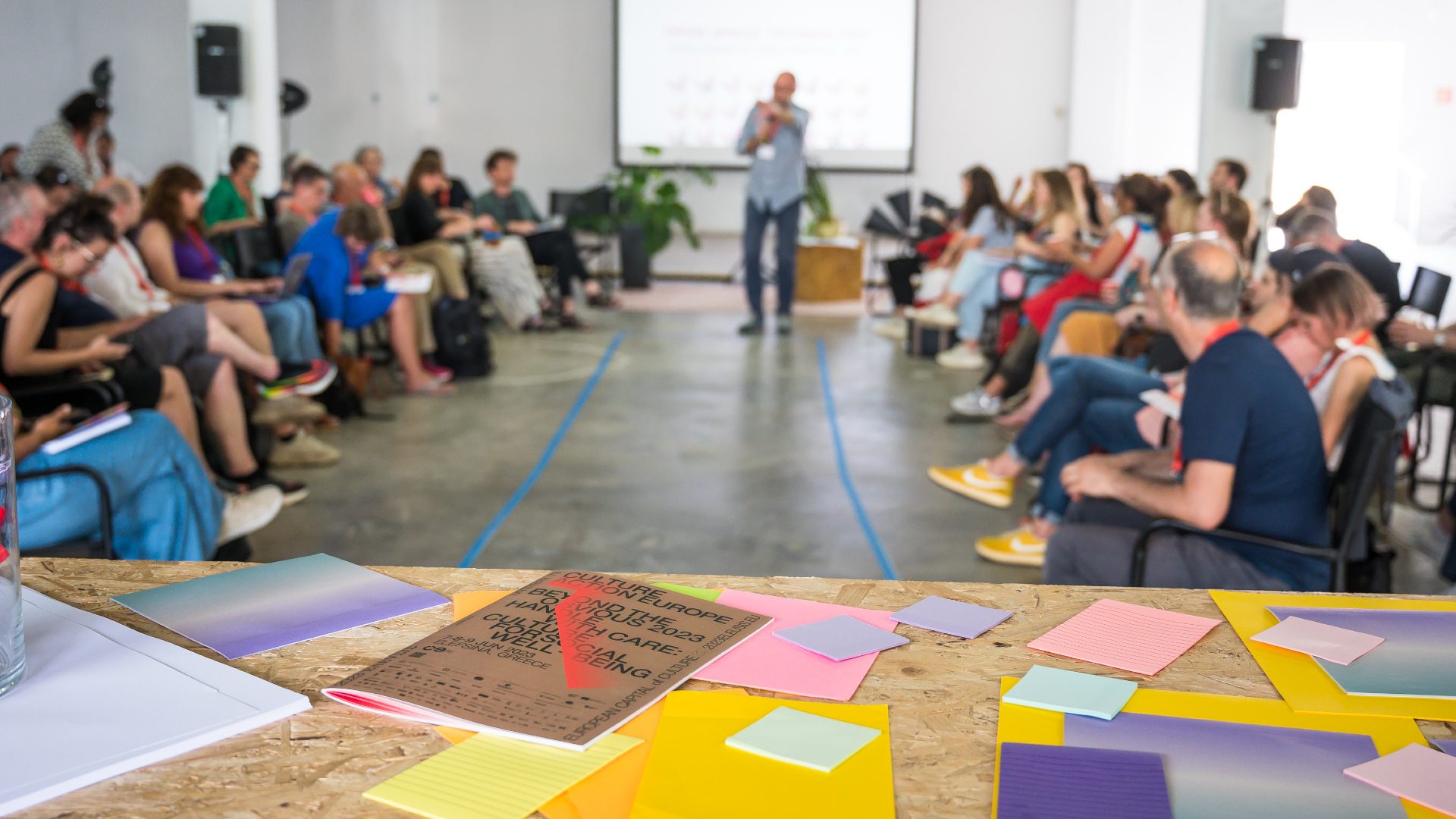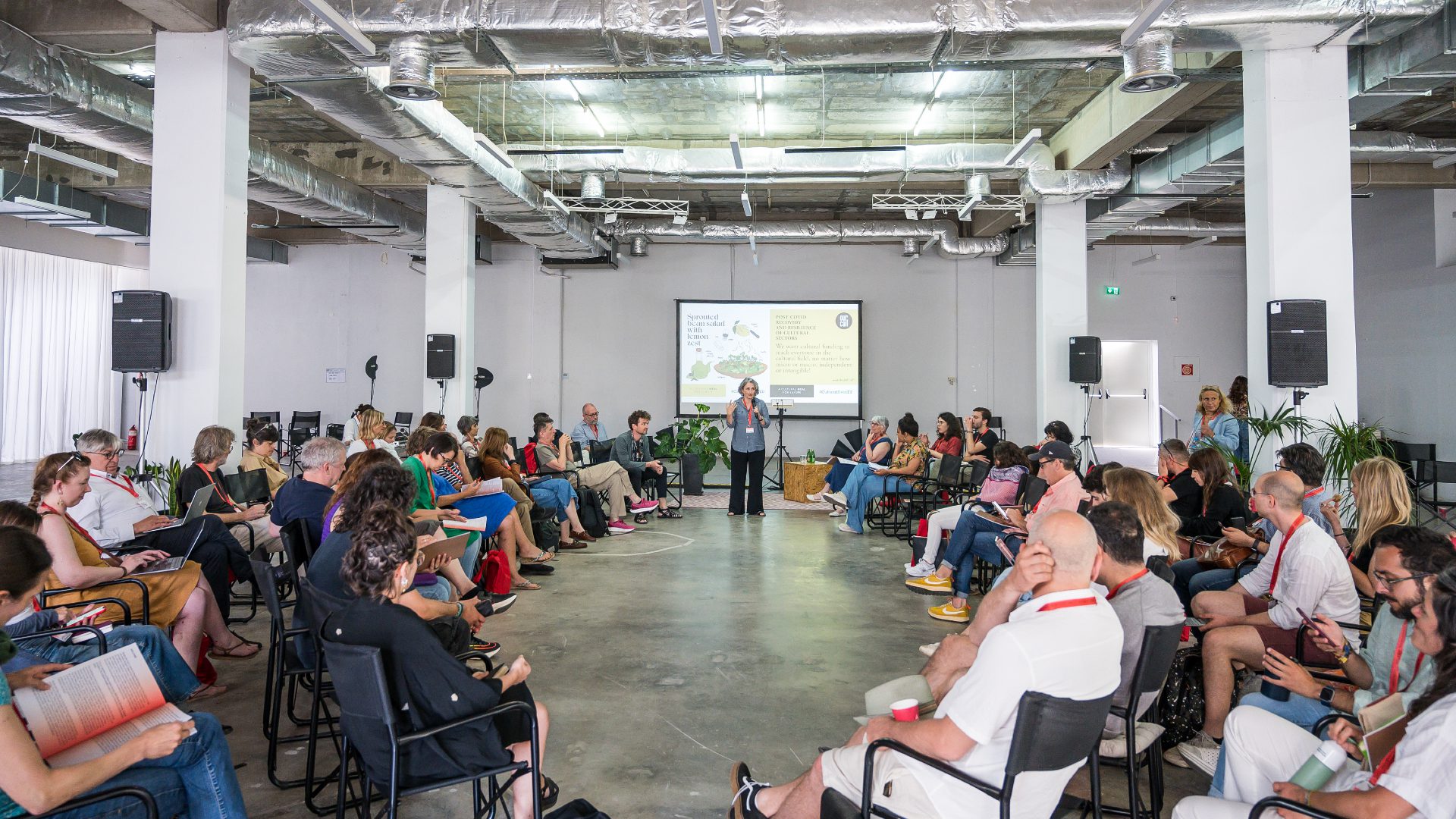
A Culture of Care
In recognition of the transformative power of Culture and its potential to shape a more compassionate and inclusive world, we, the undersigned, unite under the banner of care. This manifesto serves as a rallying call to artists, cultural organisations and professionals to embrace a politics and ethics of care as a fundamental element of our collective work.
We firmly believe that care is a universal human need that too often remains overlooked and undervalued. Care as a social concept, based on empathic and appreciative interactions, has the transformative potential to create a more compassionate and interconnected society.
Thus, we assume the responsibility to champion care as a cornerstone of our endeavours, bridging societal gaps, promoting solidarity, and challenging the prevailing inequalities that afflict our communities. By prioritising care, we envision a world where empathy, compassion, and a sense of interconnectedness can flourish.
Eleusis 2023: The Spirit of the Place
The ancient city of Eleusis, one of the most important sacred cities of antiquity, home to the Eleusinian Mysteries, to Demeter, Hades and Persephone, provides the perfect setting for this Manifesto. Persephone’s descent into darkness and subsequent transformation is an inspiration to its authors that have drawn from the contribution of 185 participants of the 2023 Beyond The Obvious Conference ´Handle With Care – Culture for Social Well-Being´ in Elefsina, Greece.
By curating care into our narratives, embracing diversity, promoting inclusivity, and amplifying the voices of underrepresented groups, we plant the seeds of empathy and foster a society where every individual feels valued, supported, and empowered to thrive.
To Care is to Act
Implementing a politics and ethics of care demands deliberate and intentional strategies from cultural organisations. We declare our unwavering dedication to the pursuit of a culture of care. Together, we envision a future where care is the guiding force that shapes our collective destiny.
We must work with determination to meet the many challenges of our time:
I. Care for Climate
We, as human beings, recognise our interconnectedness with all beings and the intricate web of systems that sustain life on our ancient planet. Our actions today shape the path for future generations, and our ability to transform the world has brought us to a critical moment.
The climate crisis is not only a crisis of science, technology or financial resources – it is a crisis of care. To avert catastrophe, care must be at the forefront of our efforts, transcending boundaries from the personal to the global. Culture is a vital resource for this global work of care, providing the foundation for transformative action. By fostering transnational institutions, alliances, and networks based on interdependency and democracy, we can enact a politics of care on a global scale.
–
As Culture Action Europe, we are committed to working towards a regenerative future, in a world capable of sustaining and nourishing all forms of life.
By fostering environmental consciousness through cultural expressions, we can promote global care for the planet and inspire local collective action towards environmental sustainability.
By adopting sustainable practices and advocating for climate action, our cultural organisations can lead by example.
By rediscovering the extraordinary scales of time and space in which our planet and species evolved, we rediscover our shared responsibility in caring for the world we will leave to future generations.

II. Care and Borders
We recognise that we are all formed, through and by our interdependencies – our survival and our thriving are always contingent on others. A caring politics must acknowledge the challenges of our shared dependence, providing us with a sense of our common humanity, enabling us to confront our shared fears and giving us the capacity to accept the complexity of our human interactions.
Recognising the current environmental sustainability challenges that our mobility brings, we must never stop crossing our borders, we must never stop nurturing connections, and we must never stop dismantling barriers if we are to envision a world where care may know no bounds.
–
As Culture Action Europe, we are committed to changing the narrative, envisioning mobility as a project in itself by continuing to promote understanding, empathy, and dialogue across borders.
By creating spaces that celebrate diversity, we can ensure that the faintest of voices is heard, challenging xenophobia and discrimination.
By supporting those who flee zones of conflict, repression, and censorship, we cultivate a culture of care that safeguards all voices, preserves diverse expressions, and enriches our societies.
We challenge the divisive nature of our borders by advocating for a culture of care that transcends physical and ideological boundaries, and we embrace the need to move across borders as an essential part of our work as artists, researchers, activists and organisers.
We believe this ability to give access and to be given access, to share and to connect, is the very foundation of our common European project and a never-ending source of inspiration.
III. Care for the Commons
The commons are a sphere of tangible and intangible resources vital for the reproduction of life. Cultural heritage, knowledge, and resources are an essential part of this commons that must also be protected and shared as a living expression of humanity’s place in the world. In the face of urgent environmental and socioeconomic challenges, we must establish forms of governance, processes, and ethics to defend and care for the commons.We recognise that cultural organisations have a special responsibility in preserving and promoting our cultural commons, ensuring equitable access and participation.
But we also recognise that this responsibility must extend far beyond the limits where our material and immaterial heritage are inscribed. It must encompass our social and economic commons and our work towards a more caring and democratic society.
–
Culture Action Europe has a crucial role to play in promoting care for the commons through advocacy, supporting policy-making and empowering initiatives.
By fostering collaborations, sharing resources, and nurturing collective ownership, we can build resilient cultural ecosystems that prioritise care and sustainability.
By resourcing and expanding public spaces as a commons accessible to all, we can foster conviviality, interconnections and the re-emergence of communal life.
IV. Communities of Care
For decades, a relentless acceleration has pushed us towards extreme forms of individualism and competition, cornering us into a fast-paced state of loneliness. Addressing the barriers and power imbalances that prevent both communities and individuals from feeling welcome in cultural organisations is crucial to overcome this.
Communities are at the heart of care, and culture can play a central role in fostering these inclusive and supportive networks. Cultural organisations create resilient communities that
address inequalities and uplift marginalised voices through engagement, participation, intergenerational care and solidarity.
–
Culture Action Europe is committed to becoming itself a true community of care by connecting a wide network of organisations, artists, professionals and researchers through a shared vision of the central place of Culture in our European project.
By working to open up spaces and institutions to all communities, transforming daily-used spaces and community events into arts and cultural spaces, we can break barriers between institutions and their audiences.
By valuing communities’ cultural resources and artistic production, we can transform public spaces into common spaces that foster connection and solidarity, providing tangible opportunities for connection and mutual aid, deepening our democracies and promoting the overall well-being of individuals and communities.
By going beyond straightforward but deceptive solutions and instead engaging in active community participation, actively listening, connecting, and making visible the often-overlooked members of society, and providing real access and opportunity to disadvantaged communities.
By listening to, mentoring and connecting our members with each other and with the wider world.
V. Care and Mental Health
We recognise our current mental health emergency, exacerbated by the COVID-19 pandemic. Cultural organisations are crucial in initiating open and liberating conversations about our well-being, promoting mental health awareness, and providing safe spaces for self-expression, connection and healing.
By prioritising care for mental health and fostering social cohesion through cultural participation, we can contribute to a society that values and supports individual and collective well-being. Culture has, in fact, an essential role to play in addressing this poor mental health, not just as an add-on to existing medical treatments but as proven effective healthcare responses in their own right.
–
Culture Action Europe is particularly committed to the active role of Culture and the arts in the prevention and treatment of mental health conditions.
By working closely with health professionals and health institutions, cultural professionals and organisations can bridge these two worlds, fostering new practices of care where care is most needed.
Furthermore, by engaging with creativity, self-expression and social connection, schools and youth organisations can foster a culture of care that promotes well-being and mental health from an early age, preventing the onset of a number of mental health issues in a whole generation.
Mainstreaming a culture of care in our educational systems would reverse today’s in-balance between prevention and treatment, challenging stigmas surrounding mental health and alleviating suffering for countless individuals in our future communities.
By prioritising mental health care, fostering collaboration between cultural and healthcare sectors, and integrating mental well-being into education, we can build a society that values individual and
collective mental health, leveraging culture’s transformative power for the well-being of all.

VI. Care and Youth
Young people deserve a culture of care that uplifts and empowers them, recognising their agency, their potential, and the central importance of their mental well-being. Cultural organisations must prioritise their needs and aspirations, embracing a model of creating for, with, and by our youngsters on their own terms.
By fostering intergenerational dialogue, and providing spaces for co-creation and co-decision in an environment where both young minds and older generations can flourish, we can cultivate resilient communities and nurture the artists, the audiences, and the cultural professionals of the future.
–
Culture Action Europe understands that a commitment to a culture of care for young people is the only way to move towards a better, more sustainable future.
This commitment should encompass a renewed focus on intergenerational dialogue, making it a fundamental and standardised practice in cultural practices and institutions.
This commitment should mobilise the broadest possible circle of care, encouraging institutions, artists and professionals to recognise the existential challenge of engaging with their future audiences, artists and professionals.
VII. Care for the Work of Culture
To build an authentic culture of care, cultural organisations must lead by example. We must implement a politics and ethics of care within our own institutions, challenging existing structures and nurturing a culture of care through active engagement. By valuing the well-being of cultural workers, sharing decision-making power, and providing support for their professional development, we create a sustainable and thriving cultural sector.
–
Culture Action Europe has been an unwavering voice, throughout the years, in defence of our sector as a whole and of our workers, professionals and artists as a particularly fragile constituency.
We will redouble this effort, ensuring that a culture of care means fair compensation, safe working conditions, freedom from power abuses and from gender-based violence, equitable access to and adequate support for their professional development, certain that only by sharing decision-making power can we build solid, resilient institutions and practices.
By sharing our knowledge and our networks, we open new pathways for meaningful change through action, advocacy, and self-organisation, and we empower our workers, artists and professionals with the agency to plan, build and retire from successful careers.
By valuing the well-being of cultural workers, and by recognising the demanding nature of several disciplines and practices, we ensure adequate support to artists, performers and
professionals before, during and after they leave the stage, nurturing a sustainable and thriving cultural sector that enriches society.
VIII. Curating Care
As curators, we are the custodians of our societies’ past, present and future, in partnership with our communities. We take on the role of storyteller and bring meaning to our collective memory and artistic expressions. It is a far-reaching responsibility to shape how we perceive ourselves and our place in the world.
As such, we have a responsibility to curate care into our narratives. By bringing together diverse perspectives, by exploring new connections, and by amplifying underrepresented voices, curation becomes a means to foster inclusivity, appreciation, and dialogue, a tool to sow the seeds of care. By nurturing a culture of care, we cultivate a society where every individual feels valued, supported, and empowered to thrive – each of us is an artwork in the making.
–
For Culture Action Europe, curating care prioritises the values of empathy, connection and understanding by placing human dignity and agency at the centre of our stories. We must listen in order to receive,
reflect, and respond.
The cultural sector must define its mission through its relevance to its community – and measure that relevance through a living dialogue within it.
We must open our doors and our hearts to the other, creating safe spaces for creative experimentation, building institutions and practices that are able and agile enough to recognise and resource wider forms of care at every scale of social life, understanding that as human beings we have limits and that our vulnerability can be a strength.
A Call to Action
By putting care at the core of our practices, we can promote well-being, transform society, and create a more just and equitable world. Together, we can cultivate a politics and ethics of care through Culture, forging a path towards a sustainable, compassionate, and interconnected future.
This commitment should be translated into concrete policies and initiatives at all levels of Culture Action Europe’s political engagement, albeit at a local, national or European level.
We invite cultural practitioners, organisations, policymakers, thinkers, researchers, activists, and artists to join us in rethinking the challenges of our time.
Let us reimagine the role of Culture in shaping our future.
Culture Action Europe thanks the European Union for the support. Views and opinions expressed are however those of the author(s) only and do not necessarily reflect those of the European Union or the European Education and Culture Executive Agency. Neither the European Union nor the granting authority can be held responsible for them.